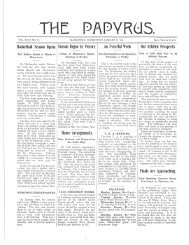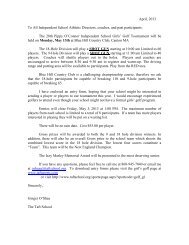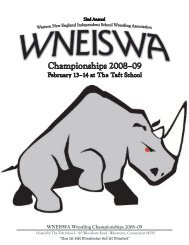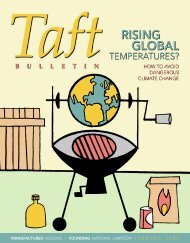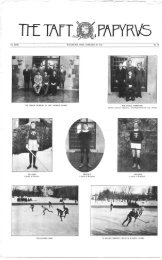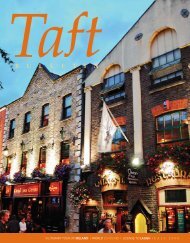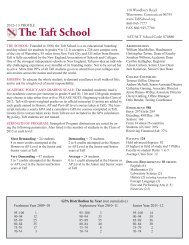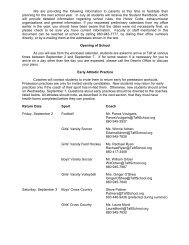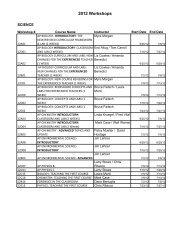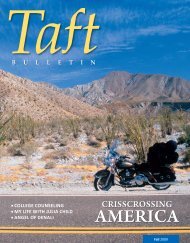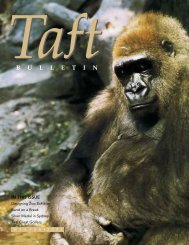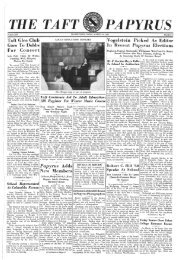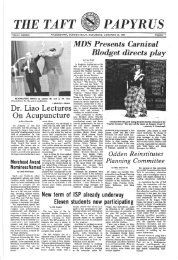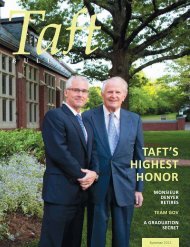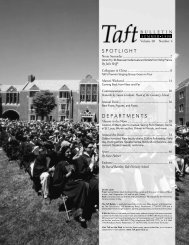Download - The Taft School
Download - The Taft School
Download - The Taft School
Create successful ePaper yourself
Turn your PDF publications into a flip-book with our unique Google optimized e-Paper software.
What’s your<br />
background; how did<br />
you get interested in<br />
sustainability?<br />
How do you see your<br />
role at <strong>Taft</strong>?<br />
What does ‘sustainability’<br />
mean to you?<br />
A<br />
I grew up in nearby Middletown, Connecticut, and spent my childhood playing<br />
in the woods of New England and sailing off its shores. I’ve been obsessed with<br />
the water and boats since I was a kid and rowed competitively through high school and<br />
Dartmouth, and have sculled ever since.<br />
As an avid hiker, I was passionate about being outdoors and continually wondered<br />
how those hills, mountains and valleys formed, and why the forests grew the way they<br />
did. After college, I sought work in the Colorado Rockies, where I scored a job as a<br />
geologist, working on a large-scale gold exploration project at the Summitville Mine,<br />
at 11,500 feet, high up in the mountains, on the Continental Divide, and surrounded<br />
by elk and deer calving grounds with golden aspen leaves in the fall and buried in<br />
snow by late October.<br />
We drilled 300-foot holes and analyzed rock on a grid pattern to construct a 3D map<br />
of the hydrothermal zone of a former volcano. As much as I loved the adventurous life of<br />
minerals exploration, that was also the turning point that drove me into the field of environmental<br />
cleanup work. Ironically, that project later became a major Superfund site.<br />
Instead, I found myself exploring the soil, bedrock and groundwater of the<br />
Northeastern U.S., in a different kind of earth exploration work—assessing and addressing<br />
impacts to natural resources by releases of oil, metals, solvents and other<br />
contaminants. I got to use all kinds of the latest technologies to delineate and clean up<br />
localized effects of the Industrial Revolution.<br />
Having enjoyed a great education, and after my wife and I had two adorable daughters,<br />
I became drawn back to academia. Not only did I want to be closer to my own<br />
kids than distant fieldwork allowed, I was also excited to further my education and give<br />
something back to the world as a teacher.<br />
I took full advantage of my thesis research time to perform case studies of eight institutions:<br />
Smith, Williams, Middlebury, Tufts, UNH, Harvard, Andover and Exeter.<br />
I focused on the experience and challenges of sustainability directors there and strove<br />
to understand how they became effective agents of change within different traditional<br />
and successful institutions. <strong>The</strong>ir stories were mesmerizing, and they proved to be a<br />
fascinating lot of people, who found ways to work productively with the whole variety<br />
of groups on their campuses.<br />
A<br />
I plan to assess the school’s present and ongoing environmental initiatives relative<br />
to other campus-based institutions, and I hope to foster leaders for the<br />
future, to promote qualities within the community that would guarantee rigorous and<br />
comprehensive discussion of current environmental issues now facing the world,<br />
I also want to help <strong>Taft</strong> to be an institutional example of sustainability, from community<br />
awareness raising and engagement to operational methods and systems.<br />
I see myself becoming embedded within the academic, community and operational<br />
life here in order to get to know everyone and everything well enough to make sound<br />
recommendations to the organization, and to work directly with the many key players<br />
who can make change happen.<br />
A<br />
For me, it literally means caring for the world and making choices in life that<br />
will provide future generations with an undiminished capacity to survive and<br />
thrive, as our own forebearers gave us. Humanity is faced with an increasingly complex<br />
and populated world and with an overflow of information due to the growth of every<br />
area of science. We are in exciting times where the choices of current generations will<br />
have long-lasting import, and where we must all work well together to ensure that the<br />
marvels of our blue planet are sustained in perpetuity.<br />
24 <strong>Taft</strong> Bulletin Winter 2012



